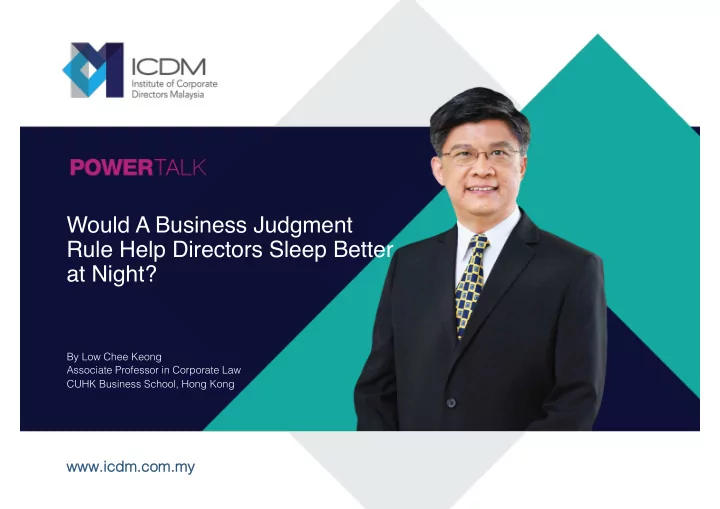

Would A Business Judgment Rule Help Directors Sleep Better at Night? By Low Chee Keong Associate Professor in Corporate Law CUHK Business School, Hong Kong www. www.ic icdm.com.my
IN THE BEGINNING … Their Lordships … accept that it would be wrong for the court to substitute its opinion for that of the management, or indeed to question the correctness of the management’s decisions … if bona fide arrived at. … nor will courts of law assume to act as a kind of supervisory board over decisions within the powers of management honestly arrived at. Lord Wilberforce Howard Smith Ltd v Ampol Petroleum [1974] AC 821 at 832 2
ONLINE POLLING Step #1 Go to www.slido.com Step #2 Enter Event Name as powertalk2 Step #3 Select Polls 3
WITH THAT IN MIND … Do you think that the current duties expected of directors are : A Too onerous B Just right C Too lenient 4
WITH THAT IN MIND… Do you think that it is not easy to successfully sue a director for breach of duty to the company? A Yes B No 5
SECTION 213(2) ‘OBJECTIVE PLUS’ The ‘ Objective ’ Directors must exercise the knowledge, skills and experience that would reasonably be expected of a director carrying out the same functions. The ‘ Plus ’ The director must also bring his or her own general knowledge, skills and expertise to the table. 6
S & E C’ B’ A’ A B C 7
CASE STUDIES COMPANY COMPANY COMPANY A B C 8
ON REFLECTION …. Do you think that the current duties expected of directors are : A Too onerous B Just right C Too lenient 9
WITH THAT IN MIND… Do you think that it is not easy to successfully sue a director for breach of duty to the company? A Yes B No 10
SECTION 214 COMPANIES ACT A director who makes a business judgment is deemed to meet the requirements of the duty under subsection 213(2) and the equivalent duties under the common law and in equity if the director – • makes the business judgment for a proper purpose and in good faith; • does not have a material personal interest in the subject matter of the business judgment; • is informed about the subject matter of the business judgment to the extent the director reasonably believes to be appropriate under the circumstances; and • reasonably believes that the business judgment is in the best interest of the company. 11
WITH THAT IN MIND … Do you think that the Business Judgment Rule is: A Too complicated B Just right C Too simplistic 12
WITH THAT IN MIND… Do you think that the Business Judgment Rule would be of any benefit to directors? A Yes B No 13
THE RATIONALE The Delaware Yankee ALI – A Different Yankee The Aussie way 14
THE DELAWARE YANKEE A ‘ Safe Harbour Rule ’ that is strictly not a rule Conserves judicial resources by The Delaware Yankee protecting decisions made ‘a presumption that in making a • free of disabling conflicts of business decision the directors of interest a corporation acted on an ALI – A Different Yankee informed basis, in good faith and in • with exercise of some (not the honest belief that the action necessarily reasonable) care was taken in the best interests of The Aussie way • on a rational (not necessarily the corporation’ reasonable) basis Aronson v Lewis Cede & Co v Technicolor, Inc 473 A.2d 805 (Del. 1984) at 812 634 A.2d 345 (Del. 1993 ) 15
ALI – A DIFFERENT YANKEE • An affirmative or independent judgment The Delaware Yankee • Must be informed with some care – not due care • An absence of disabling conflicts of interest ALI – A Different Yankee • A rational basis for the decision The Aussie way • Good faith – the ‘ smell test ’ surrogate J 16
THE AUSSIE WAY Section 180(2) Corporations Act • must make a decision: sec 180(3) • judgment in good faith for proper purpose • no material personal interest • informed about the subject matter • possesses a rational belief that the decision is in the best interest of company ASIC v Rich (2009) 75 ASCR 1 ASIC v Mariner Corporation (2015) FCA 589 17
LET’S PAUSE AND PONDER Which model do you prefer? A. B. C. DELAWARE ALI AUSSIE Why? 18
THE MALAYSIAN HYBRID • Courts are ill equipped to review business decisions a process which is compounded by corporate ownership landscape with dominance of family & state • Fusion to allow directors to have two bites of the cherry § The Yankee to scrutinise the decision making process § The Aussie to assess the general state of knowledge • NOT a legal transplant but Malaysia (Boleh)- centric 19
LET’S RETHINK … Which model do you prefer? A. B. C. DELAWARE ALI AUSSIE D. MALAYSIAN HYBRID 20
WITH THAT IN MIND … Do you think that the Business Judgment Rule is: A Too complicated B Just right C Too simplistic 21
WITH THAT IN MIND… Do you think that the Business Judgment Rule would be of any benefit to directors? A Yes B No 22
FURTHER READING Low Chee Keong & Low Tak Hay The Business Judgment Rule: A Safe Harbour for Directors? Journal of the Malaysian Judiciary 159- 191 (January 2018) Available at http://www.jac.gov.my/images/journal_malaysian_judiciary/jan2018.pdf 23
MORE READING Low Chee Keong & Low TakYip When is the Board Accountable for Delegation and Reliance? A Case Study of the MTR Corporation [2016] Vol 30 Australian Journal of Corporate Law 285-303 Available at https://papers.ssrn.com/sol3/papers.cfm?abstract_id=2487710 24
THANK YOU 25
Panel Discussion CHEE KEONG LOW Associate Professor in Corporate Law, CUHK Business School PHILIP T.N. KOH Senior Partner, Mah-Kamariyah & Philip Koh DATUK YVONNE CHIA Chairman, Standard Chartered Bank Malaysia Moderated by KAMARUL BAHRIN HARON Deputy Editor-in-Chief, ASTRO AWANI 26
Recommend
More recommend